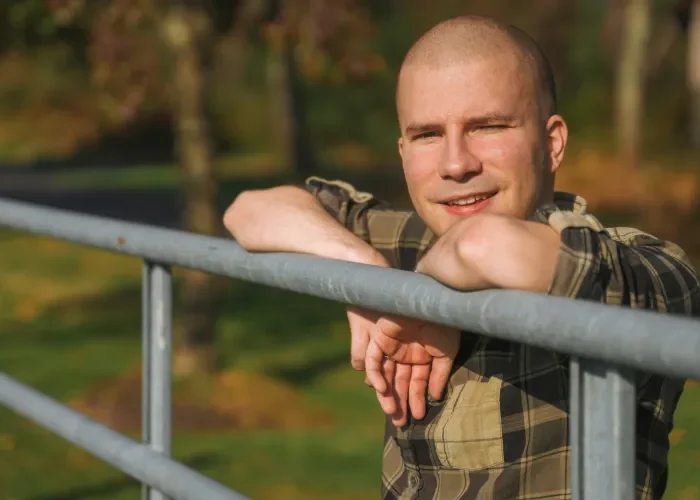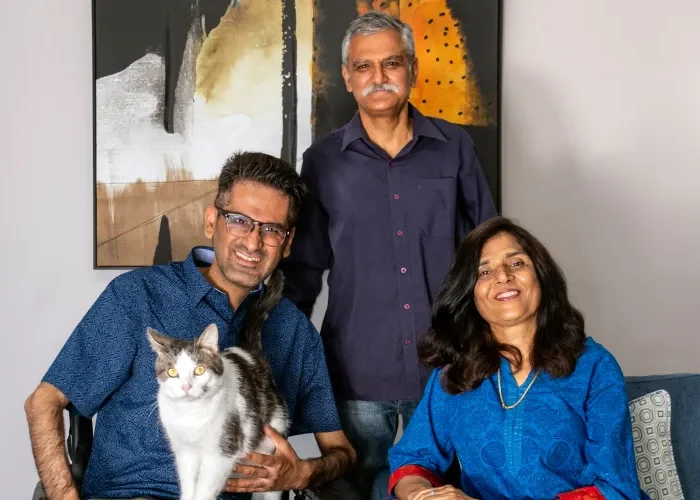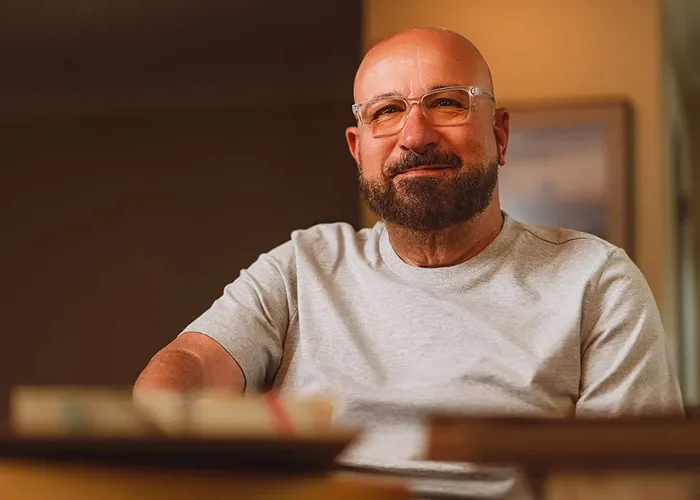Bryan and his wife, Maddie, walk side-by-side through the fields and farmland near their new home in western New Jersey. They hold hands and follow a paved path that winds its way through the Delaware river valley, where a rich tradition of agriculture remains, preserving much of the natural landscape around them. Bryan loves seeing the world on foot. It’s been a life’s passion, and on each trail, there are those who have chosen to walk beside him—none more significant now than Maddie.
For the longer version of this video, click here.
The couple stops to rest and Bryan leans on a cattle gate before his legs get too tired. He takes out his hiking pole and braces himself. Maddie posts up beside him. “I didn’t used to walk long distances,” she says. That all changed after she met Bryan, always keen on exploring the next beautiful spot. Now, she can hold her own on the trail. In fact, hiking with Bryan is nice because it forces her to slow down a bit. “When I hike alone, I listen to an audio book and just charge ahead,” she explains. “But with Bryan I have to take in the environment around me, pause, and enjoy nature.”
In a society that claims to reward the first to each finish line, the rabbit over the hare, Bryan is finding peace in taking things at his own pace. It is his response to living with Becker muscular dystrophy, a rare neuromuscular disorder that progressively weakens his muscles, and gradually makes physical tasks more difficult. There is no treatment that stops the progression of Becker.
Therefore Bryan, now in his 30s, must adapt to the changes taking place in his body, temper his physical expectations of himself, and find the beauty in the perspective he has gained by slowing down. Maddie recognizes this and how it has solidified her feelings about him. “His resilience. His capability. These are the reasons I fell in love with him,” Maddie exclaims. “He looks at the world with such grace, kindness, and curiosity, and I admire him for that.”
“All my childhood, I struggled with running, walking up steps, walking up hills,” recalls Bryan, who was diagnosed with Beck at age eight. “It was obvious that there was something different about me from other kids my age.” With the news that a cousin had been diagnosed with Becker, his parents made the correlation. They took him in for genetic testing and the results were positive. He also has another cousin who has since been diagnosed with Becker.
The diagnosis did not alter Bryan’s life right away however. His parents continued to take him on long road trips each summer to different parts of North America. He developed a love for expedition and being in nature. In the back of his mind, he understood some of that would ultimately change, but with so much variance in the disease progression of Becker, the when and how was a guessing game at best.
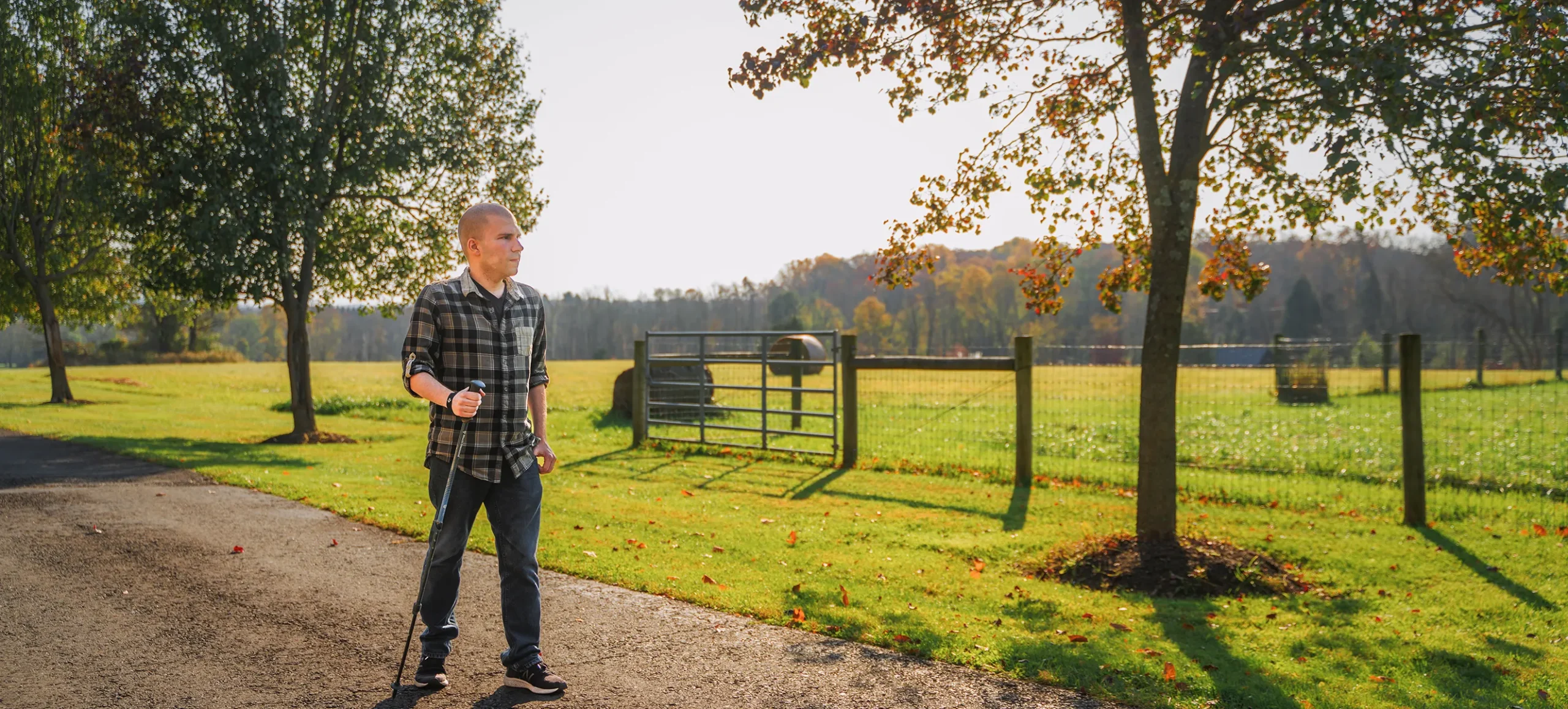
Symptoms became harder to ignore during his senior year of high school. Climbing the stairs had become noticeably tricky, and something that required intense focus in order to maintain balance and not fall. Soon, falling itself became more and more of an issue. Bryan began relying less on his legs to get him places, opting for elevators over stairs, and avoided lifting heavy objects, such as his drum set, which he played with bands throughout high school.
Despite how difficult these changes were, he met them with the desire to do what he could, while he could, resulting in Bryan increasing the amount of time he spent outdoors and doing even more of what he loved. He worked on a dude ranch in Wyoming during the summer one year in college and spent the next two exploring the vast American West. After finishing college, he dreamed of doing a long, solo trek.
“I knew I couldn’t do the Appalachian Trail. It was too tough,” Bryan reflects. When he learned about the Camino de Santiago, a network of trails across western Europe leading to Santiago de Compostela, in far western Spain (Galicia), he knew he had found his journey. “I realized I wasn’t going to be able to do things like [the Camino] my whole life. It was important for me to do it while I still had a chance.” While some walk the Camino de Santiago for religious reasons, others seek personal growth and transformation, and this appealed to Bryan the most. It also offered certain accommodations such as hostels and cafes that would make thru-hiking much safer for him.
In August of 2017, 24-year-old Bryan lowered himself carefully onto a train platform in St-Jean-Pierre-du-Port, France. Behind him lay everything he knew: his friends, family, and his job (which graciously gave him seven weeks off), while ahead lay miles of ancient trails, mountains, valleys, villages, and the diverse assortment of other pilgrims—people from all over the world—walking west toward the same destination.
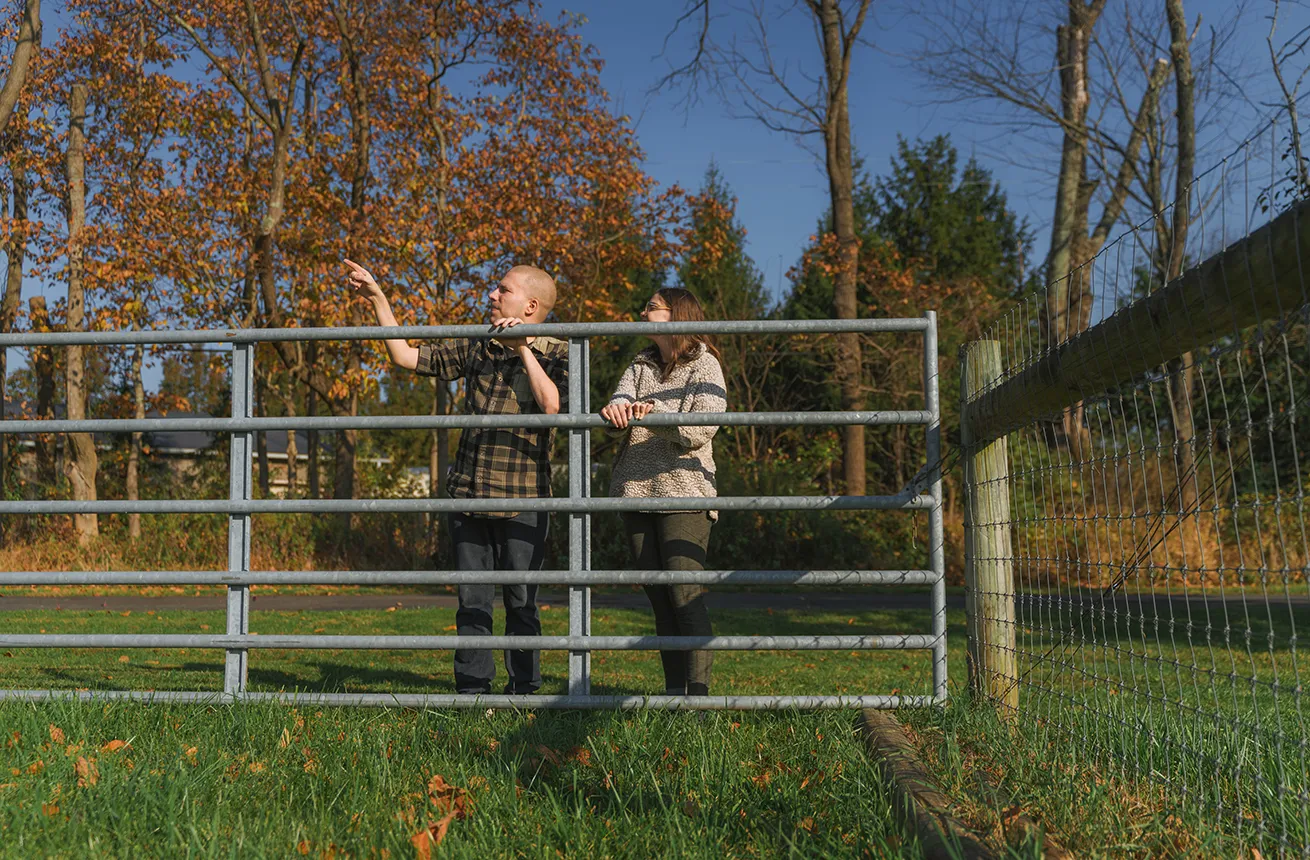
The first day of walking nearly broke him. “I constantly thought about quitting,” recalls Bryan. “Every day, I thought I could take a taxi to the next town. I just had a mindset that I was going to see it through.” Over the next several days Bryan faced his self-doubts one fall after the next. Picking himself up from the dirt became as much a part of his walk as anything else, as did the others on the trail who helped him back to his feet and offered to carry his pack up difficult stretches. Solo as he was, other pilgrims provided companionship and assistance throughout the long journey.
The personal transformation that occurred over the next several weeks was vast and profound. Bryan overcame serious doubts about his ability to complete the trek, and in the process gained a valuable perspective on his life. This is documented, in detail, in what became Bryan’s first book, published in 2022: My Own Pace: A Story of Strength and Adversity on the Camino de Santiago. The memoir recalls Bryan’s journey told with an honest and vulnerable voice that hits close to home for any reader.
Learning the balance between his own strength, receiving support from others, and the challenges and limitations that everyone (regardless of capability) must face, are all lessons that have followed Bryan closely till this day. “I had to find my own rhythm, my own pace, until I got to the end,” says Bryan. “It relates to my life now. I am facing daily challenges that I have to move through at my own pace, just to get through the day.”
In the years since his trek, Becker has begun to affect Bryan more and more. Things like climbing stairs, picking items up from the ground, and lifting heavy objects have gone from very difficult, to not possible. “It feels a lot more real now. It’s not just this abstract thing—it’s here,” admits Bryan. “That’s a little difficult to accept sometimes. It’s not something I’m imagining.”
In recent years, Bryan has, once again, needed to redefine who he is in the world. “You think a lot about what makes your identity,” he continues. “Small things. Like walking up steps. When you lose little things like that, it’s taking away part of who you’ve been.” There are moments when the whole breadth of Becker seems daunting—the inevitable decline of physical abilities—yet Bryan strives to find the positives.
It was something that initially drew Maddie to him. When she first met Bryan, via a dating app during the quarantine months of the early COVID-19 pandemic, it was not obvious that he was living with Becker. On a humid summer’s day, they walked along the Delaware River Canal in Lambertville, a spot equidistant to both their homes at the time.
The two had instant chemistry. When Bryan explained that he was working as a paraprofessional in the public school system, Maddie instantly felt a level of comfort and openness. “It takes a certain kind of individual to have the patience and kindness to work with children who are going through something like that,” Maddie says.
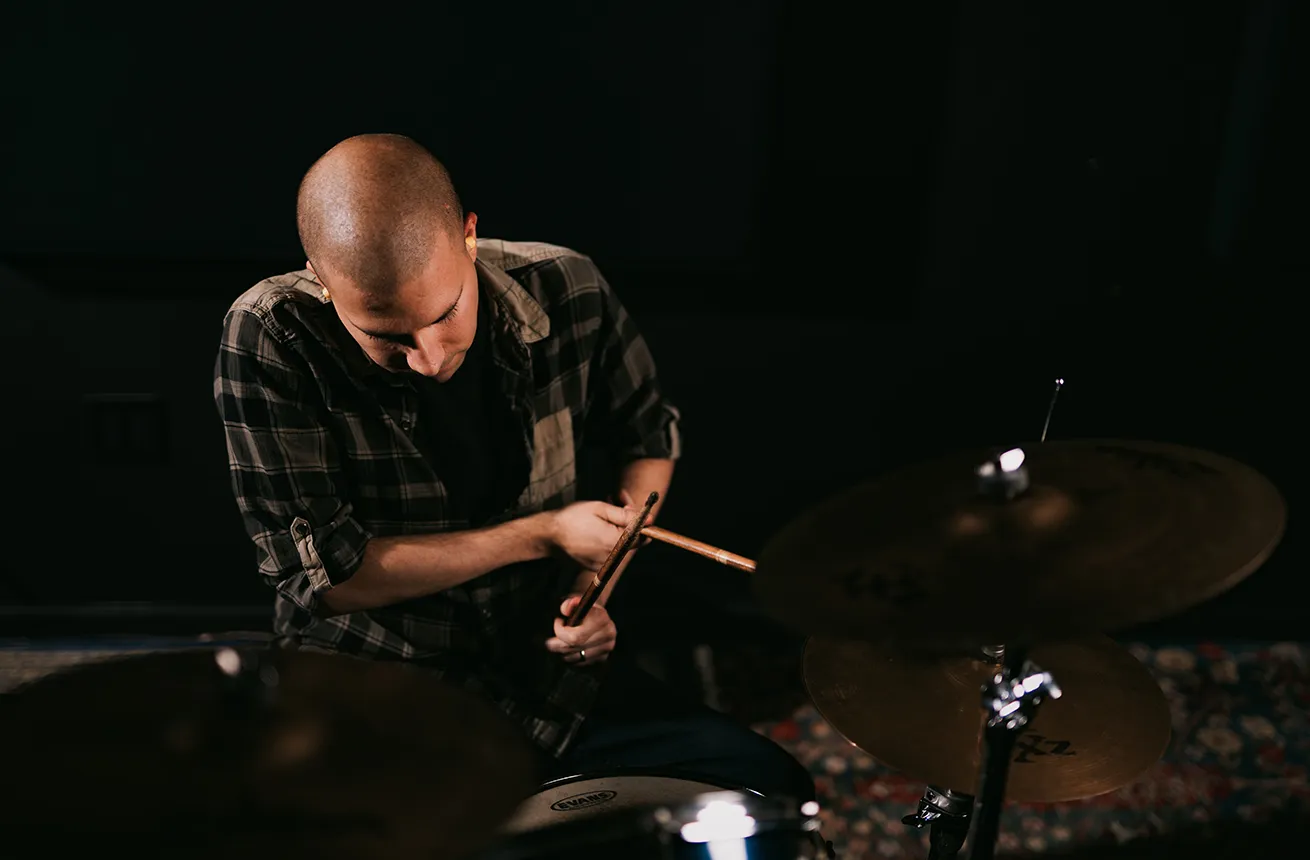
Maddie lives with Tourette syndrome and had little reservation bringing this up on their first date. Likewise, Bryan was quick to share about his Becker. “Her Tourettes is very different from muscular dystrophy,” says Bryan. “But we both related to the fact that we had something about us that made us very different from other people.”
That initial meeting, and all the subsequent walks they shared, set the groundwork for a meaningful partnership and life together. The two now live not far from where they first met, in western New Jersey, and are busy building a home, and a life together.
Back at their home, Bryan checks his collection of house plants—prodding the dirt to see if they need water—part of his love of biology and for other living things. Around the house, Maddie helps him with most physical tasks, something she has grown accustomed to. “We’ve moved a lot in the last couple years,” she relays. “I’ve had to take the lead on carrying furniture, boxes, moving things around, bending over to pick things up. The benefit of that is that I’ve gotten stronger. I’m glad I can be that sort of support.”
Maddie knows that Bryan’s muscles will continue to weaken with Becker. “Down the road, I know that things are going to get more challenging and that’s something we’re going to have to deal with. But when I look at Bryan, my husband and partner, that’s not what I think about. I think about all the exciting things to come—creating a beautiful house together, building a family, seeing what we can do as a partnership.”
Ultimately, Bryan sees himself as going through a major transition, but with the support of his family, community, and new wife, he feels ready for the tough days ahead, determined to make the most of it. “I’m at this crossroads in my life... I’m going from being very able-bodied and able to do what I want, to suddenly having to slow down and not being able to do things I used to be able to do.”
As his body changes, so will Bryan’s abilities, but what seems certain is that he will continue doing what he loves as long as he can. Bryan heads down to the basement where his drum set sits. He picks up his sticks and sits on the stool. His feet and arms begin to tap out a beat and soon Bryan is enmeshed in the wall of sound he is busy creating. Cymbals ring, the high-hat clicks, and in moments like this, he feels in tune with his whole self, going at his own rhythm, his own pace.
